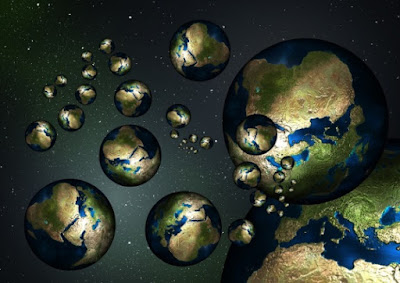The Faith-Based Multiverse
Y'all understand multiverse, right? It's when a song has a lot of, well, verses. "Amazing Grace" has —
"You made me facepalm very hard with that one, Cowboy Bob."
Moving on... There are many suppositious remarks about parallel universes, and some of those universes are just like ours with very slight changes. If you were able to saddle up and ride sideways through these universes, eventually the changes would add up and you might find, say, Clinton Richard Dawkins as a respected biblical creationist, Rome never fell, dinosaurs are common pets, and so on. Some very interesting stories have arisen from the parallel universe concept. I've even read that some think every decision that is ever made causes a new universe to form where the unmade choice in this one has been made in that one.
Folks are adding the multiverse to the foundering Big Bang choplogic, and astronomy is being dragged into the mix. When you have one concept based on assumptions and personal preferences (the Big Bang) that is contrary to actual observed evidence, may as well bring along another dose of pseudoscience by adding on the multiverse, right? Sure, cosmic and biological evolution have things to add on, like we do with Web browsers. (About as scientific as the ideas of an astrophysicist who believes aliens are all around us, but it's all based on his assumptions, not science.) Why do they resort to faith-based ideas that have no scientific support? Because then they would be compelled to be intellectually honest and admit that the universe was Created, just like God told us in his Word.
"You made me facepalm very hard with that one, Cowboy Bob."
Moving on... There are many suppositious remarks about parallel universes, and some of those universes are just like ours with very slight changes. If you were able to saddle up and ride sideways through these universes, eventually the changes would add up and you might find, say, Clinton Richard Dawkins as a respected biblical creationist, Rome never fell, dinosaurs are common pets, and so on. Some very interesting stories have arisen from the parallel universe concept. I've even read that some think every decision that is ever made causes a new universe to form where the unmade choice in this one has been made in that one.
 |
| Another fine image by Gerd Altmann (geralt) at Pixabay |
Scientists today increasingly talk and write about the multiverse. What is the multiverse? The multiverse is the belief that our universe is just one of many universes. Presumably, each universe exists parallel to and independent of one another. If this sounds like science fiction, philosophy, or religion, it is, because the multiverse could be classified in any one of those categories. Whatever the multiverse is, it definitely is not science. How can the multiverse be scientific (given that science is the study of the natural world using our five senses) when other universes, by definition, are beyond our ability to detect? If the multiverse is not science, why do so many scientists believe in it? The reasons have nothing to do with science but instead are the result of presuppositions and worldview.To finish reading, click on "Multiverse: Is Our Universe One of Many?"